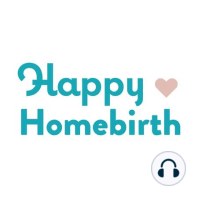42 min listen

Ep 59: "But What if Something Goes Wrong?"- How Midwives Handle Emergencies at Home
FromHappy Homebirth
Ep 59: "But What if Something Goes Wrong?"- How Midwives Handle Emergencies at Home
FromHappy Homebirth
ratings:
Length:
77 minutes
Released:
Jan 20, 2020
Format:
Podcast episode
Description
Beautiful One Midwifery
“But what if something goes wrong?” Perhaps the most often question asked when a homebirth mother reveals her plans to her loved ones. Sure, having a homebirth sounds like a good idea if everything goes right—but when it doesn’t? What then?
Today’s episode is going to cover this topic and several more with two incredible midwives. Tiffany and Kelly are the midwifery partners behind Beautiful One Midwifery, and their perspective is so useful. I am so happy to offer this episode as a resource for you, mama who is considering homebirth, and for your loved ones who would like to know more about what happens when things “go sideways”. Such an amazing listen.
Please remember that the opinions of my guest may not necessarily reflect my own and vice versa, and although Kelly and Tiffany are midwives, none of us are acting as your overseeing medical provider, so please be sure to continue to see your doctor, midwife, or if you’re like me, your chiropractor.
Show Notes:
Tiffany and Kelly were both doulas before becoming midwives. They knew of each other for quite a while before realizing how similar their styles were.
Both decided to go to midwifery school. Upon completion of their programs, they decided to open a practice together. Both were interested in a sustainable practice.
Today’s topic: What if something goes wrong?
Acknowledge that there are risks when having a baby- no matter where you give birth.
3 major complications: shoulder dystocia, hemorrhage, and need for neonatal resuscitation
Kelly mentions that in truth, midwives are actually there for these specific events, not so much the easy peasy labors. Midwives are for when things “go a little sideways”
They discuss how baby is always telling us a story, we just have to pay attention to what is being said. Typically if something is off, little issues here and there will begin to “ping”
Tiffany and Kelly always prepare their clients for the 3 common complications prenatally. In fact, they bring their supplies (oxygen masks, tanks, etc) to the home visit to let parents see what is involved so that they are not taken by surprise if it’s needed during birth
Neonatal resuscitation:
About 1 in 10 babies will require at least a little extra help
A few helpful breaths
Postpartum Hemorrhage:
They emphasize nutrition prenatally (calcium supplement)
Discuss how there are a number of reasons for too much bleeding, but there are many ways to help stop it
Hands outside, hands inside, herbs, and Pitocin/other prescribed medications
A great way to prevent pph is a hands-off delivery of the placenta. Allowing mom to do this on her own.
Shoulder Dystocia:
A great idea is to ask your midwife what she typically does in the event of a shoulder dystocia
Beautiful One Midwifery puts a strong emphasis on postpartum care. They have extended postpartum care packages that they offer not only their clients, but their community as a whole. I hope to see this become the norm!
Learn about midwifery in your state: https://mana.org/about-midwives/state-by-state
Episode Roundup:
We often forget that no matter where we give birth, risk is involved. There’s no guarantee that any birth will have a specific outcome—whether at home or in the hospital
The midwives model of care is amazing for catching red flags and signs of concern because care is so hands-on prenatally. This allows a true understanding of both mother and baby, so when it’s time to make a change, a change can be made safely
Neonatal Resuscitation, Postpartum Hemorhhage and Shoulder Dystocia are the most common concerns, yet for all 3, midwives take specific measures to bring the situation back into the realm of normal and safe. As Tiffany said, “Everybody doesn’t just die”
I want this episode to serve as a reminder- talk to your care provider! Ask them what it is that they do when complications arise so that you can feel confident. Ask them if they will show you the equipment so you’re com
Released:
Jan 20, 2020
Format:
Podcast episode
Titles in the series (100)
Ep 24: Leah's Midwife Handles a Serious Complication: Show Notes: Leah is a registered nurse engaged to a UFC fighter, Brandon Davis. They have just grown their family with a new baby! She had a homebirth with her first baby. When asked how she decided to have a homebirth, she said she’s always been fasci... by Happy Homebirth